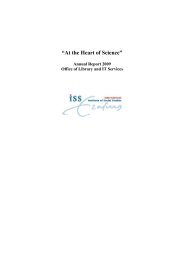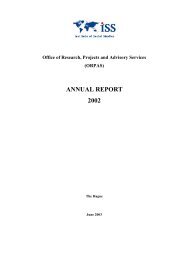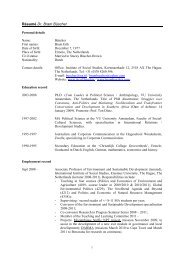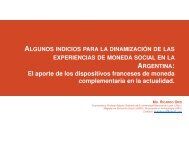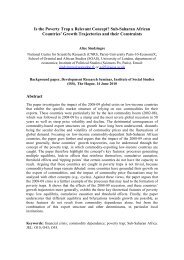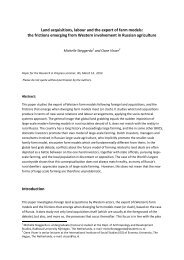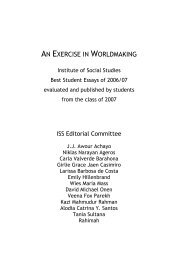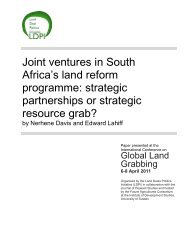AN EXERCISE IN WORLDMAKING 2009 - ISS
AN EXERCISE IN WORLDMAKING 2009 - ISS
AN EXERCISE IN WORLDMAKING 2009 - ISS
You also want an ePaper? Increase the reach of your titles
YUMPU automatically turns print PDFs into web optimized ePapers that Google loves.
140 STEF<strong>AN</strong>IA DONZELLI<br />
that I will consider it relevant. This wariness aims not to “betray” Puntos’<br />
point of view, with which I strongly sympathise.<br />
The triangulation of the sources of data collection finds its justification<br />
in the limits that I will experiment in grasping the different nuances<br />
of Nicaraguan society, determined by my condition as an outsider.<br />
Moreover, in analysing data I will inevitably use interpretative categories<br />
typical of my context of origin, based on my personal experience and<br />
identity. Combining this observation with the idea that a text may be<br />
open to different interpretations (Eco, 1962) makes me evaluate primary<br />
data as indispensable to offer depth and accuracy in this research.<br />
WHICH EPISTEMOLOGY?<br />
Although I consider likely to change my epistemological posture during<br />
the process of researching, at this stage of the investigation I would like<br />
to combine a feminist post-structuralist/post-modern position with elements<br />
of Gramscian thought, more grounded towards a critical realistic<br />
position in the epistemological spectrum. Notwithstanding that I am<br />
conscious of the differences, and sometimes contradictions, of the epistemological<br />
perspectives considered, I will try to make them work coherently,<br />
since both of them have particular virtues that I appreciate.<br />
Post-modernism argues that human beings get to know the world<br />
through language: it is through language that perceived sensory impressions<br />
are communicated, so language becomes the data to analyse in order<br />
to know reality. Cameron states that ‘those claims to data constitute<br />
knowledge for others and with knowledge comes a potential for the exercise<br />
of power’ (Cameron, <strong>2009</strong>: 4). This refers to Foucault’s conceptualization<br />
of power/knowledge that Mills explains as follows: “the process<br />
of exclusion that lead to the production of certain discourses [labeled as<br />
facts] rather than others […] is a claim for power… the only between<br />
facts and falsehood is power” (2003: 67-68).<br />
The recognition of the operation of power in the production of<br />
knowledge leads post-modernists to “deny any view of reality that assume<br />
the independence of individual mental processes and intersubjective<br />
communication” (Rosenau, 1992: 110-111). What follows is scepticism<br />
about impossibility of knowledge closure on the past or the future,<br />
rejection of any generalizations and celebration of contextual relativism<br />
(Cameron, <strong>2009</strong>).



